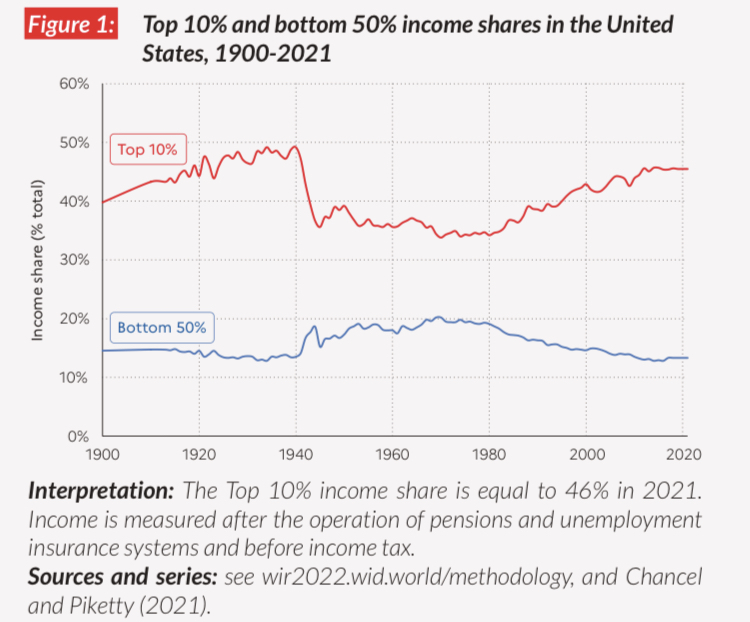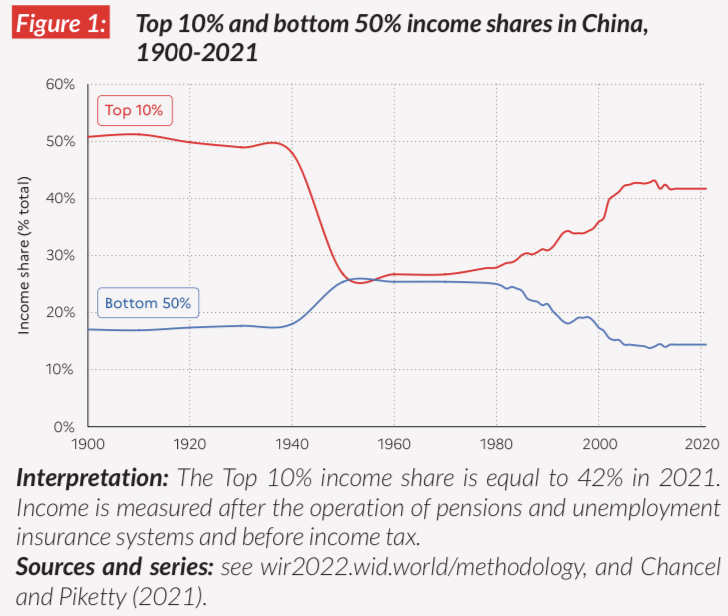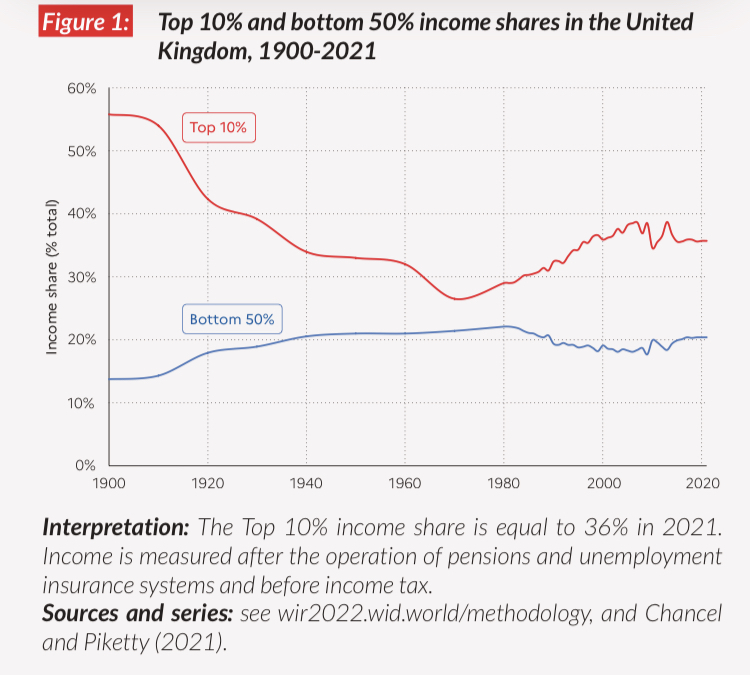- cross-posted to:
- communism@lemmygrad.ml
- cross-posted to:
- communism@lemmygrad.ml
Source: Piketty's World Inequality Report 2022
I shared this deep in a dunk thread earlier and figured there's probably many comrades who haven't seen this data. I think it's very good rhetorically because a lot of libs have an incredibly vibes-based impression that the Soviet Union was just an Animal Farm old-boss-same-as-the-new-boss situation.
Instead, this demonstrates that Russia underwent one of the most dramatic inversions of income inequality of any country in recorded history.
For comparison here is the US over the same time period:
Show


China:
Show


And the UK:
Show



Massive income inequality w Chinese characteristics.
Actually existing socialism is when you have worse inequality than post brexit Britain.
It’s worth noting that in China the poorest have seen incredible increases in their standard of living and extreme poverty has been essentially eliminated during the same time period. So its entirely incomparable to say, the United Kingdom or United States where life is getting worse for poor people while the rich get richer.
That said, yeah, income inequality is a contradiction that comes with using capitalism, even a controlled form of it, to develop the means of production. It’s a contradiction that the Communists running China are aware needs to be managed as evidence by plans to address it in upcoming 5 years plans, whereas the focus of previous 5-year plans has been about growing the means of production and eliminating the worst poverty and food insecurity, goals which were met or exceeded.
actually existing socialism is when you manage to achieve what China has achieved from the absolutely destitute conditions that the communists started with, and didn't have the advantage of having the largest empire in human history up to that point feeding material surplus into the core
Yeah the communists did a great job of priming China for a rise to superpower status, but I think they'd not be so stoked on this turn to state capitalism
Aren't you the one I had a conversation about "state capitalism" with before? China is not state capitalist in the proper sense, though some sectors like oil can be described that way.
I doubt it, I don't bring it up that much because I don't find it to be a very productive discussion, but its possible
There are texts out there which Mao wrote, which I wish I could find, where he sounds just like Deng. China is different from the USSR for many reasons, one of which is that the Bolsheviks rapidly gained power over a vast region while the CPC governed various regions of China for decades before winning the civil war. Both before and after that victory they constantly had to deal with the issue of how you build up the productive forces when you have almost nothing to begin with WITHOUT betraying the revolution. China’s current policy is basically the USSR’s NEP on steroids, and is anyone here going to argue that the NEP was not socialist?
I’ve also been thinking of something Deng said—how a market is socialist if socialists control it and capitalist if capitalists control it. This might seem ridiculous at first glance, but would any Marxist call an ancient Roman slave market capitalist? It really is something qualitatively different, even if it is still horrifying and exploitative.
deleted by creator
If this were the case, AES states would have stopped calling themselves socialist and then they would have subordinated themselves to the imperial core a long time ago. The USA would not be thirsting for Chinese blood if China were an ally of imperialism.
Furthermore,
“The highroad of history is not a sidewalk of the Nevsky Prospect. It passes all the way through open fields, at times it cuts across marshes or forests. Those who are afraid of soiling their hands had better keep away from politics."
https://redsails.org/compromise-and-sacrifice/
I’ve also spoken with Chinese people living in China about whether China is socialist or not. Every one I’ve spoken with thinks the question is absurd. Just to take one example, they all learn Marxism in school and have easy access to Marxist texts in their libraries. If the government were revisionist, why would it expose all of its people repeatedly to radical texts? Certainly there are gusanos in China who are eagerly fleeing to America so they can get murdered by lynch mobs, but the vast majority of people there approve of the CPC.
When capitalism began, it was forced to use the feudal tools at hand (such as century-long fixed rate rents) to build itself up and destroy feudalism. Socialism is no different. China is building its productive forces while getting many capitalists to eat out of its hand. Once the BRI and the BRICS have built up an alternative world economy that no longer requires the participation of the USA (and once they can be certain that the USA will not respond to this by launching all its nukes), they will move on to the next stage of socialist development. If they press the communism button now in such a hostile environment, they will lose everything.
deleted by creator
Okay, I didn’t know I was talking with someone who has family in China and who might even be living there now, so I'm sorry if my tone was less than polite. I've spent a lot of time writing this response so please feel free to correct anything I've written here.
Your own questions kind of bothered me last night and I spent some time looking into the issue of state capitalism. I did end up finding a brief note by Mao, where he describes China in 1953, but sounds like he's describing it in 2023. The idea of state capitalism goes back to Lenin and even Engels, who called it the final stage of capitalism. Basically, once the bourgeoisie is no longer in control of capitalism—capitalism having become a public rather than private affair, with the state taking control of public utilities and then entire industries—it becomes possible to build a classless society. The bourgeoisie no longer needs to exist, which means that the proletariat no longer needs to exist, since each is defined by the other. The issue that it seems Marx and Engels didn't consider was the possibility that socialism would begin outside the imperial core, one country at a time, rather than the imperial core turning socialist first. I'm not sure it's possible for socialism to happen so long as imperialism still exists. The question people keep asking is: is China socialist? When the real question may be: is the world socialist?
Right now the choice for China seems to be: allow the West to turn China into Iraq, or keep doing state capitalism. I suppose China might be allowed to turn into Japan, in the best-case scenario, where its development is frozen indefinitely, and huge amounts of China's taxes go toward propping up the American war machine. As far as I can tell, China is betting on the BRICS and the BRI (as well as technological development) freeing it from America's grip. I also looked into some liberal criticism of China yesterday and saw them complaining about how China's rate of economic growth is slowing down and how the real estate market there is in trouble, and when I saw that Evergrande owes hundreds of billions of dollars (some to China's banks, some to foreign investors), I did start to wonder what the plan is here. I'm confused also about how there is seemingly a lot of property speculation while 90% of Chinese people own their own homes. (To his credit, Xi did recently say that homes are for use, not speculation.)
I'm aware that things aren't perfect in China, and it does look to me like the bourgeoisie is superfluous. I also saw a critique by Richard Wolff, who basically said that China needs more democracy in the workplace. In talking with Chinese people, it sounds like workplaces there aren't too different in their basic setup from workplaces here in the USA, the difference being a stronger social safety net, a total lack of inflation, and the looming threat of the CPC over the boss's heads. So if China adopted Wolff's methods (which I think most of us would define as socialism), my guess is that workers would opt to work less, and to focus on satisfying immediate material needs rather than producing commodities for export (correct me if I'm wrong obviously). In the short run this would probably produce a great deal of happiness, but in the long run wouldn't it lead to weakening China? Fewer exports means less money coming in, which means you can't import things, and you can't keep up with Western technology or even Western ideology, which increases the possibility that the West will destroy you. The market, as terrible and inefficient as it is, does prod huge numbers of people into performing the admittedly unpleasant task of keeping up with the West and even, as seems to be the case now, surpassing it. Perhaps in the future it can be destroyed, but for the moment it might be necessary.
At the same time, China's rate of economic growth was also slowing down when Mao was getting older, I think during the stagflation crisis in the West that gave us neoliberalism. In China, Deng did Dengism to fix this problem. Now the rate of economic growth is slowing down again (even if China's economy is still growing roughly ten times faster than the USA's). There must be people in the CPC wondering if state capitalism has taken China as far as it can go. Once it reaches a certain level of development, dangerous boom-and-bust cycles appear to be inevitable.
My question is, what is China supposed to do? If you were in control, what would you do differently?
I also have some questions about China's covid response. Some British research firm recently published a report saying that when China abandoned zero covid, two million people there died. I looked into their methodology, and said that they found this number basically by extrapolating from Baidu searches, an Adrian Zenz-like approach. Does this number seem realistic? We've lost huge numbers of people in places like the USA and India, and during particularly bad periods it became quite difficult for these two countries to hide the bodies. I saw no footage from China—aside from some weird and very suspect tiktok videos (as well as private funerals)—showing what I saw from India or the USA. If there were two million excess deaths, where are the bodies?
I ask because I live in the USA but have been very close to moving to China for months now. My life is probably as good as it can be for someone living here, but I can't stand the liberalism any longer (even if I know that liberalism also exists in China). I have kids, and also just think that they would have safer, better lives there. My spouse is the only thing really holding me back. She's Korean (I lived in South Korea for years), and is pretty hostile to China. What do you think? Should I stay here, or should I go? I know it's not necessarily your job to advise me on my family life but I'm still curious about your opinion.
AES is when you ride on the coattails of the work and achievements of the communists who came before you while you lead the country towards capitalism.
I would recommend you read this short essay by Red Sails, particularly this quote by capitalist Deng Xiaoping, cynically saying why socialism must be an act in the future and thus enriching himself and his buddies:
Wait, shit, sorry, that was Marx and Engels. This one is actually Deng:
...
It might be possible that instead of us, living in fully capitalist societies, being the ultimate arbiter of what socialism and communism is and is not, we might instead be the students and the Chinese and Cubans and North Koreans and so on are the teachers.
I agree, we should be students, but whom should we be students of? The countries you mention are not monolithic, and they have obviously had changes in political line and objective conditions over the decades.
Mao and the CPC went through much of the struggle that Marx and Engels describe, but they did it by building socialism, not capitalism. I choose to be a student of the China's socialist roaders, not China's capitalist roaders.
This is en excellent book on the subject, with a free PDF download available https://foreignlanguages.press/new-roads/from-victory-to-defeat-pao-yu-ching/
Personally I'm not particularly critical of the China of today, since they're an important opponent to the imperialism of the Global North. But it is very clear to me that their economy is not socialist, despite them practising democratic centralism and having significantly expanded workers rights compared to neoliberal countries.
Actually existing socialism is when everybody has the same income
I don't think that's a very charitable characterization of their perspective comrade. It's not unreasonable to be concerned about those levels of inequality.
Ik, I'm not really trying to start a conflict or debate
Just playfully responding to one casual quip with another
If they put a more serious critique or question I would've ignored it or replied with an equally respectful response
I don't think the other one was being very charitable either
deleted by creator
A very large part of Chinese income inequality is the huge rural-urban divide. All countries have it but its an order of magnitude worse in China so there are basicaly 2 different countries within China . Having 300 million people in the biggest cities earning western levels of income and 300 million people in rural small towns and villages earning a 4th of that skews the metric a lot EVEN tho life in rural ereas is indeed that much cheaper.Thats hugely different than wages in London being 1.5 times more than "rural" england but prices becides rent being almost at the same level. And thats besides talking about wealth vs income inequality